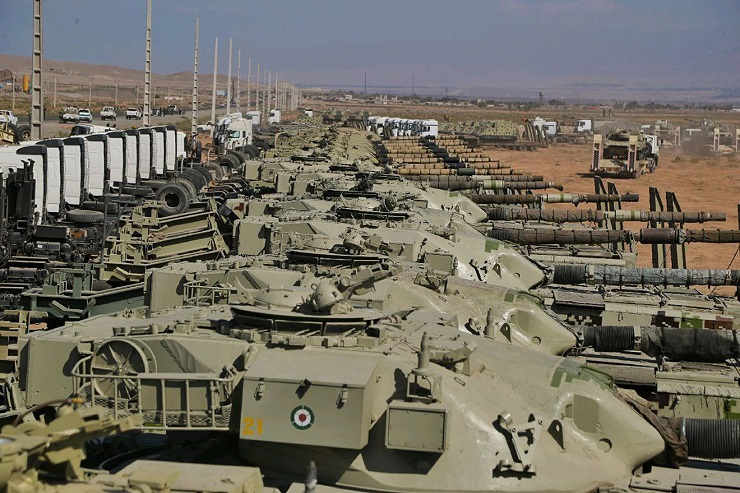Speaking in Vienna on the sideline of Iran’s much talked about nuclear talks, EU negotiators warned that should Iran prove unwilling to cooperate in a meaningful fashion would lead to devastating consequences.
“If they don’t show that they are serious about this work, then we’ll have a problem,” diplomats from the E3 nations of Britain, France and Germany said. “The next 48 hours will be very important.”
Former US President Donald Trump’s legacy is weighing heavy on the Middle East … I would go as far as to venture that his unilateral decision to do away with the JCPOA back in 2018 made the world a much more dangerous place. And though Trump may have had a point as far as his critique of the structure of the deal was concerned, to renege on an international treaty of such magnitude, set a precedent we have yet to fully appreciate. How can America hope to position itself as a reliable partner when its treaties and agreements hold on the whim of Washington’s ever revolving door of politicians?
By all accounts the JCPOA marked a shift in dynamics in that it offered hopes of normalisation between Iran and those western powers, which since the fall of the Shah in 1979, looked upon the Islamic Republic as a foe to aggressively isolate, if not contain.
If we take into account that under the JCPOA Iran committed itself to restricting its nuclear program, thus offering assurances that it would no longer ambition to become a latent nuclear power, success laid in the space such an accord offered.
Trump decided to explode the tentative window his predecessor and European counterparts carefully structured. Are we poorer for it? Most definitely … the JCPOA was a breakthrough far beyond the remit of the nuclear program. It represented a reset in international relations in a region fraught with tensions for the better. Who knows what else could have been achieved if not for President Trump.
Today the United States said to be committed to reinstate the Nuclear Deal. Only this is 2021 … 2015 is long gone. Geopolitical dynamics have evolved beyond recognition, and whether or not Washington cares to admit it or not, the world no longer holds its breath for America. Our collective geopolitical centre of gravity is shifting away from the White House … it is East, towards Russia and China that world powers are now looking towards for directions.
While the Islamic Republic may have been in a consilient mood back in 2015, agreeing to a gradual move towards political and financial normalisation, Tehran today, is not entertaining America’s threats of “crippling sanctions” and further escalation should President Biden’s wishes be ignored. This leaves diplomacy at a dangerous standstill.
In truth it is unlikely diplomacy will win this battle. Especially since most parties to the Deal have conflicted interests. The new JCPOA is being held ransom to changing regional dynamics and America’s diminished influence in the Middle East.
Needless to say that Washington’s capitulation in Afghanistan did not escape Tehran.
So what now? Well now we may all want to brace ourselves … whatever tensions are currency brewing in Vienna may lead to a dangerous military stand-off, world powers will have no choice but to get involved in.
When Israel says it reserves the right to do ‘whatever’ it feels it needs doing to protect itself, it means it. Nuclear Iran – latent or not, represents too much of an existential threat to the small Middle Eastern nation for its military brass to ignore.
Israel Foreign Minister Yair Lapid called earlier this week on French President Emmanuel Macron to strengthen sanctions against Iran, asking that “a credible military threat must be exercised.”
For several decades now Iran has said time and time again that its nuclear ambitions were purely civilian and not in the least geared towards the military. Although the Islamic Republic is not exactly lying it is not telling the whole truth either.
Allow me to explain. Iran wants to become a latent nuclear power, meaning it wishes to acquire the technology and expertise to, should it one day decide to, quickly build the weapons it needs.
As far as Israel is concerned Iran is hedging its bets towards nuclear militarisation. No amount of diplomacy will assuage.
Objectively speaking we ought to recognise that nuclear latency can be achieved with solely peaceful intentions. Now this is not to say that a country with such ‘abilities’ might not once decide that it wants to weaponize its politics by playing the nuclear hedging game and thus apply undue pressure onto its foreign partners.
It is impossible to ignore the fact that since 2018, the Islamic Republic has gradually abandoned its ‘nuclear’ commitments by enriching uranium up to 60% purity – a short step from weapons-grade levels of 90%.
To just assume that Iran will not act on its newfound powers should it indeed acquire those powers is a fool’s errand. It will never take politically – there is too much mistrust and resentment between all interested parties for any such hope to materialise.
Fear these days is driving the bus – fear and paranoia.
What happens next is anyone’s guess, but if I was to take one, I would expect to see Israel take matters into its own hands and for the United States to then engage. America’s hawks might actually relish the idea of a fight between Israel and Iran as it would give them the narrative for a regime change in Tehran.
Catherine Shakdam is a research fellow at the Al Bayan Centre for Planning & Studies and a political analyst specializing in radical movements. She is the author of A Tale of Grand Resistance: Yemen, the Wahhabi and the House of Saud. She writes exclusively for the online magazine “New Eastern Outlook”.
 RSS Feed
RSS Feed















 December 7th, 2021
December 7th, 2021  Awake Goy
Awake Goy 
 Posted in
Posted in  Tags:
Tags: 













